
10 tips to keep 'achoos' from interrupting your 'I do's'

Santa Monica, CA-
You want your wedding day to be memorable for all the right reasons. While selecting the color scheme and writing your vows, don't forget another important consideration: allergies.
The last thing you want is a series of "achoos" to interrupt your "I do's," or worse, send someone to the hospital. With these 10 tips from the American College of Allergy, Asthma and Immunology, you can limit allergy concerns on your big day.
- The sweet smell of love
Some guests may be sensitive to cologne or perfume, so, on a day with so many hugs, handshakes and slow dances, it's best to go easy. The allergic response is a reaction to odors created by volatile organic compounds (VOCs) and can cause headaches, sneezing, watery eyes and runny noses.
- Fido as best man?
If you’re planning to include your best pet pal in your wedding, make sure none of the bridal party is allergic. They'll be the ones closest to your pet during the ceremony, so you want to make sure they don't have an allergic reaction.
- Avoid the flames
Your burning love may have brought you to the alter, but burning candles can cause an allergic reaction. Scents from candles (especially a lot of them) can trigger asthma, so consider using LED candles at the reception instead. Bonus: they're safer, too!
- Include your allergist in your planning
If the bride or groom suffers from allergies or asthma, it can be wise to meet with an allergist a few months prior to the wedding day. Make a consult with us today to create a wedding plan with no hitches.
- Got your dress? Now think about medications
If you have allergies, start your medications well before symptoms usually start. You don’t want to have a red nose, or be sneezing and wheezing during the ceremony. Also, be aware of side effects — including drowsiness — of some medications.
- Create a safe menu
To find out about any severe food allergies among guests, add a line on your RSVP card or include a section on your wedding website so guests can give you this important information. The most common food allergens include eggs, milk, tree nuts, fish, shellfish, wheat and soy.
- Plan for pollen
The warm-weather months are the most popular times to get married. If you want an outdoor wedding, be aware of when pollen counts are highest. In spring and summer, during tree and grass pollen season, levels are highest in the evening. In late summer and early fall, during ragweed pollen season, levels are highest in the morning.
- Forget flower worries
There are many beautiful flower options with low allergy risk to use at your wedding. The key is to select varieties that produce little-to-no pollen. You can't go wrong with classic roses. Other allergy-friendly flowers include begonia, columbine, crocus, daffodil and geraniums.
- Create self-care baskets
Consider creating baskets to place in bathrooms that are stocked with basics to combat allergies and other concerns. For example, you could include eye drops and tissue packs, plus some saline spray. Not very romantic, but handy!
- No bees invited!
For outdoor weddings where stinging insects might be present, add tweezers, bandages and antiseptic ointment to your basket. If the bride or groom are allergic to stinging insects, an indoor wedding might be the best bet.
A little advance planning can make your wedding super romantic — and free of allergy and asthma symptoms.
Congratulations and I hope you found my tips helpful,
Dora Afrahim, MPAP, PA-C
Allergy & Clinical Immunology Medical Group
For more information about treatment of allergies and asthma, visit our website at www.SneezeWheeze.com, or reach us by telephone: (310)828-8534 or by e-mail: FrontOffice@allergyandclinical.com
You Might Also Enjoy...


FDA Approves the First Peanut Allergy Treatment

Telehealth: The Advantages of Telemedicine

Four Tips to Help you Stay Calm and Ease Sniffling, Sneezing, & Wheezing this Holiday Season

Keeping Allergies and Asthma at Bay is the Best Gift



